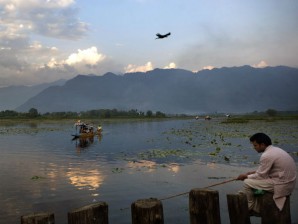In The Know: Green Accounting

In this photo taken on Wednesday, May 13, 2012, Kashmiri Muslims fish on the shore of Nageen Lake on the outskirts of Srinagar, India. Traditional measures of economic progress like GDP are being criticized as inadequate for ignoring such downsides as pollution or diminishing resources from fresh water to fossil fuels. There is increased urgency to arguments for a more balanced and accurate reckoning of the costs, particularly as fast-developing nations such as India and China jostle with rich nations for access to those limited resources and insist on their right to pollute on a path toward economic development. (AP Photo/ Dar Yasin)
Green Accounting involves putting a value on a country’s natural resources, like forests and seas, in order to have a more complete “snapshot” of a country’s economic performance.
“At the very minimum, every time we hear reports about GDP (gross domestic product) growth in the news, we should also hear how sustainable the growth really is,” John Talbert, World Resources Institute senior economist, said in an article.
Also called “environmental accounting,” it ultimately aims to have integrated statistics showing the relationship between the environment and the economy.
Under that type of accounting, countries modify their System of National Accounts (SNA) to reflect the use and depletion of natural resources. Data from the SNA are the basis of major economic indicators, like GDP and gross national product (GNP).
In having data that show the contribution of the environment to the economy, as well as the costs of pollution and environmental degradation, governments can come up with policies tackling natural resource management and sustainable development.
Article continues after this advertisementWhile various countries have already experimented with environmental accounting, there has been no international consensus on a standardized method yet.
Article continues after this advertisementExperts have criticized the current system of computing economic indicators, like the GDP, as “narrow.” The World Conservation Union said SNAs do not reflect some elements, such as environmental expenditures—for instance, the cost of replacing property destroyed in landslides due to deforestation.
“The lack of valuation for natural resources in the environment is one of the major reasons for the continuing decline of ecosystems,” Glenn-Marie Lange, World Bank senior environmental economist, said in an article on Scientific American’s website.
In the Philippines, the National Statistical Coordination Board began implementing the UN’s System of Environmental-Economic Accounts (SEEA) in 1998. The pilot compilation included data on the country’s forests, fish, water, mineral and energy, and land and soil. Kate Pedroso, Inquirer Research
Sources: IUCN.org, Scientific American, the Philippine Environmental and Natural Resources Accounting Project (Enrap Phase II) Main Report, United Nations Statistics Division